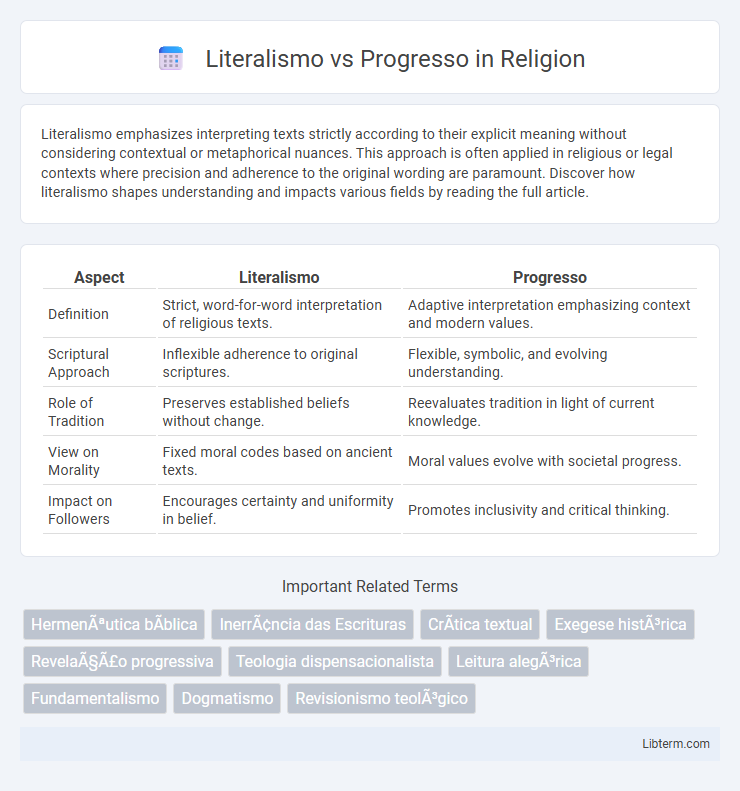Literalismo emphasizes interpreting texts strictly according to their explicit meaning without considering contextual or metaphorical nuances. This approach is often applied in religious or legal contexts where precision and adherence to the original wording are paramount. Discover how literalismo shapes understanding and impacts various fields by reading the full article.
Table of Comparison
| Aspect | Literalismo | Progresso |
|---|---|---|
| Definition | Strict, word-for-word interpretation of religious texts. | Adaptive interpretation emphasizing context and modern values. |
| Scriptural Approach | Inflexible adherence to original scriptures. | Flexible, symbolic, and evolving understanding. |
| Role of Tradition | Preserves established beliefs without change. | Reevaluates tradition in light of current knowledge. |
| View on Morality | Fixed moral codes based on ancient texts. | Moral values evolve with societal progress. |
| Impact on Followers | Encourages certainty and uniformity in belief. | Promotes inclusivity and critical thinking. |
Definindo Literalismo e Progresso
Literalismo refers to the strict adherence to the exact meaning of texts or doctrines, often applied in religious, legal, or literary contexts where interpretation remains rigid and fixed. Progresso emphasizes continuous improvement and adaptation through innovative thinking, embracing change to achieve development and advancement across societal, technological, or intellectual domains. Defining these concepts involves contrasting Literalismo's focus on preservation and faithfulness to original meanings with Progresso's dynamic pursuit of growth and transformation.
Origem Histórica dos Conceitos
Literalismo emerges from a strict adherence to traditional texts or doctrines, rooted in early religious interpretations and conservative epistemologies of the 19th century. Progresso, contrastingly, is grounded in Enlightenment ideals and scientific advancements that emphasize empirical evidence and societal evolution. The historical origin of these concepts reflects a tension between preservation of foundational beliefs and adaptation to modern knowledge frameworks.
Literalismo: Características e Princípios
Literalismo emphasizes strict adherence to the exact wording and original context of texts, prioritizing unaltered interpretation over modern adaptations. Central principles include maintaining traditional meanings, rejecting metaphorical or symbolic readings, and upholding the authority of foundational documents, especially in religious or legal frameworks. This approach often results in resistance to progressive changes and a focus on preserving established doctrines and practices.
Progresso: Ideias Centrais e Implicações
Progresso centers on embracing innovation, social reform, and scientific advancement as drivers of societal growth and improved quality of life. It advocates for adaptive change, valuing empirical evidence and inclusive policies that address inequality and promote sustainability. The implications include dynamic economic development, enhanced human rights, and a forward-looking culture that challenges rigid traditions to foster resilience and global competitiveness.
Literalismo nas Religiões e Tradições
Literalismo nas religioes e tradicoes interpreta textos sagrados de forma estrita e inflexivel, limitando a adaptacao a contextos culturais e historicos contemporaneos. Essa visao pode gerar conflitos na convivencia social, especialmente em sociedades pluralistas onde multiplas crencas coexistem. A compreensao literalista frequentemente impede o dialogo inter-religioso e a evolucao das praticas espirituais diante das demandas modernas.
Progresso e Transformações Sociais
Progresso e transformacoes sociais impulsionam avancos tecnologicos, educacionais e culturais que promovem inclusao e equidade. Movimentos sociais e politicas publicas alinhadas ao progresso fomentam a mudanca estrutural, reduzindo desigualdades e ampliando direitos. Esse dinamismo continuo reconfigura a sociedade, estimulando inovacao e melhorias na qualidade de vida.
Conflitos entre Literalismo e Progresso
Conflicts between literalism and progress arise from literalism's strict adherence to traditional texts or beliefs, which often resist adaptation to new scientific discoveries and social changes. Progress relies on reinterpretation and innovation, challenging rigid frameworks that literalism defends as unchangeable truths. These opposing approaches generate tensions in areas like education, law, and cultural development, where evolving knowledge confronts fixed interpretations.
Exemplos Práticos no Mundo Atual
Literalismo often manifests in rigid interpretations of texts or rules, limiting adaptation to contemporary issues, as seen in strict legalist approaches to constitutional law in countries like the United States. Progresso emphasizes flexible, context-aware reforms, exemplified by policy shifts in Scandinavian countries that integrate technological innovation and social welfare to address climate change and social inequality. Real-world examples highlight how literalist resistance to change can stall social progress, while progressive models foster sustainable development through data-driven decision-making and inclusive governance.
Desafios e Críticas aos Dois Lados
Literalismo enfrenta criticas por sua rigidez interpretativa que pode limitar a adaptacao a contextos sociais e cientificos contemporaneos, dificultando a evolucao do pensamento. Progresso, embora promovendo inovacao, e acusado de desconsiderar tradicoes essenciais e valores culturais, gerando resistencia e conflitos ideologicos. Ambos os lados enfrentam desafios para equilibrar a preservacao de fundamentos com a necessidade de adaptacao dinamica as mudancas sociais e tecnologicas.
Caminhos para o Equilíbrio e o Diálogo
Literalismo often limits interpretations to rigid, fixed meanings, while Progresso embraces adaptive, evolving perspectives that foster inclusive growth. Caminhos para o equilibrio involve open dialogue that respects foundational principles yet remains receptive to innovation, promoting mutual understanding. Effective dialogo bridges literalist rigidity and progressive flexibility, enabling harmonious coexistence and constructive development.
Literalismo Infographic

 libterm.com
libterm.com